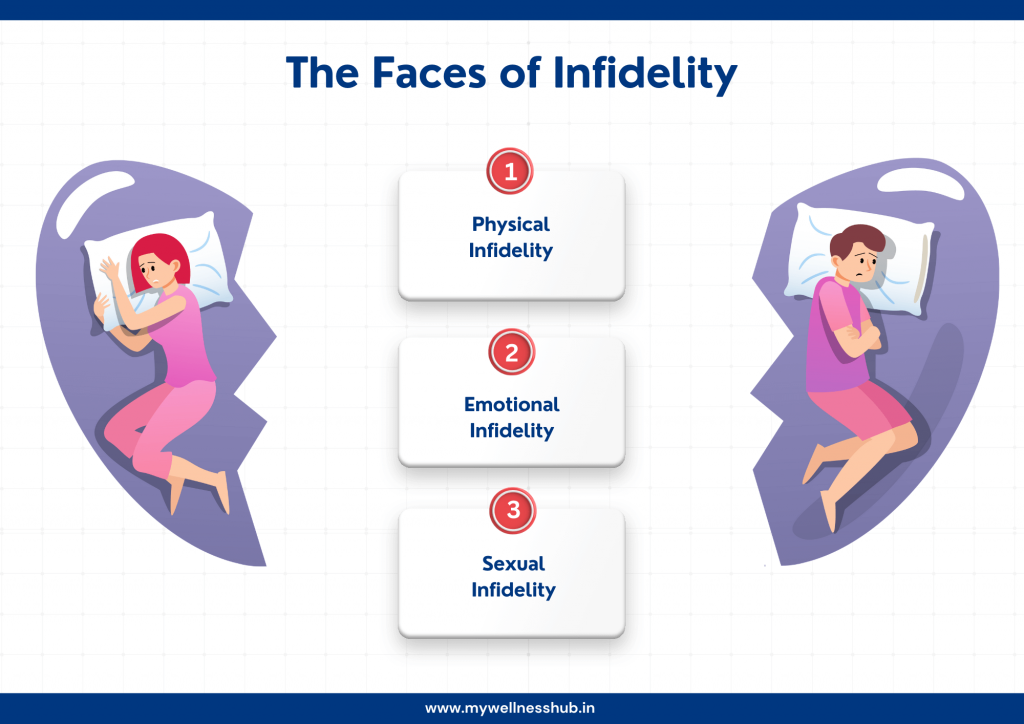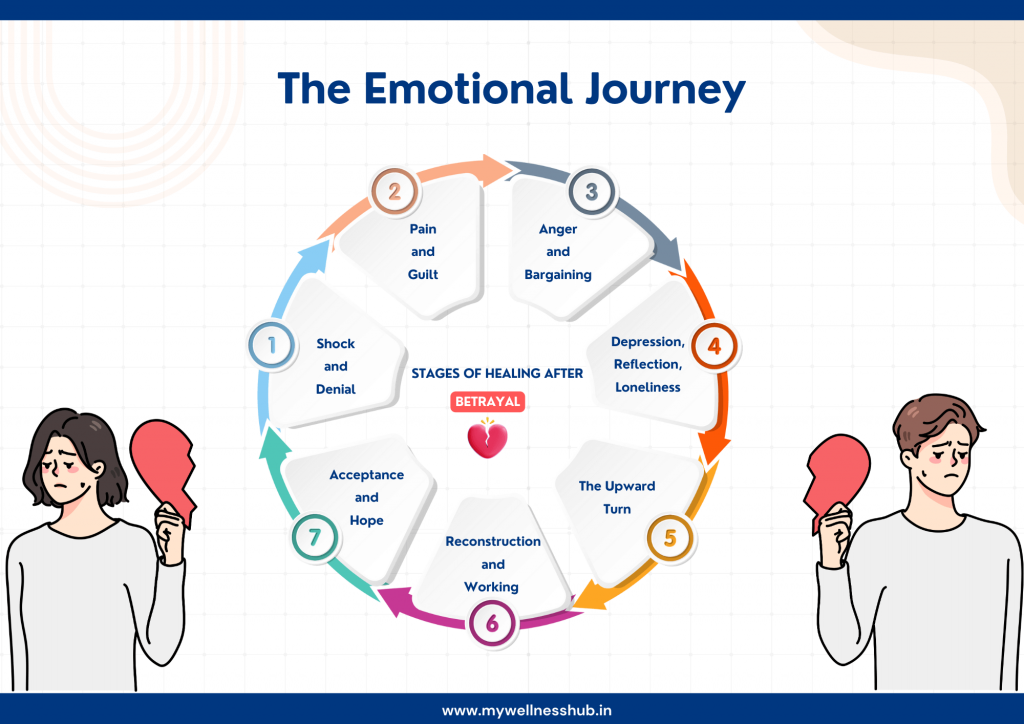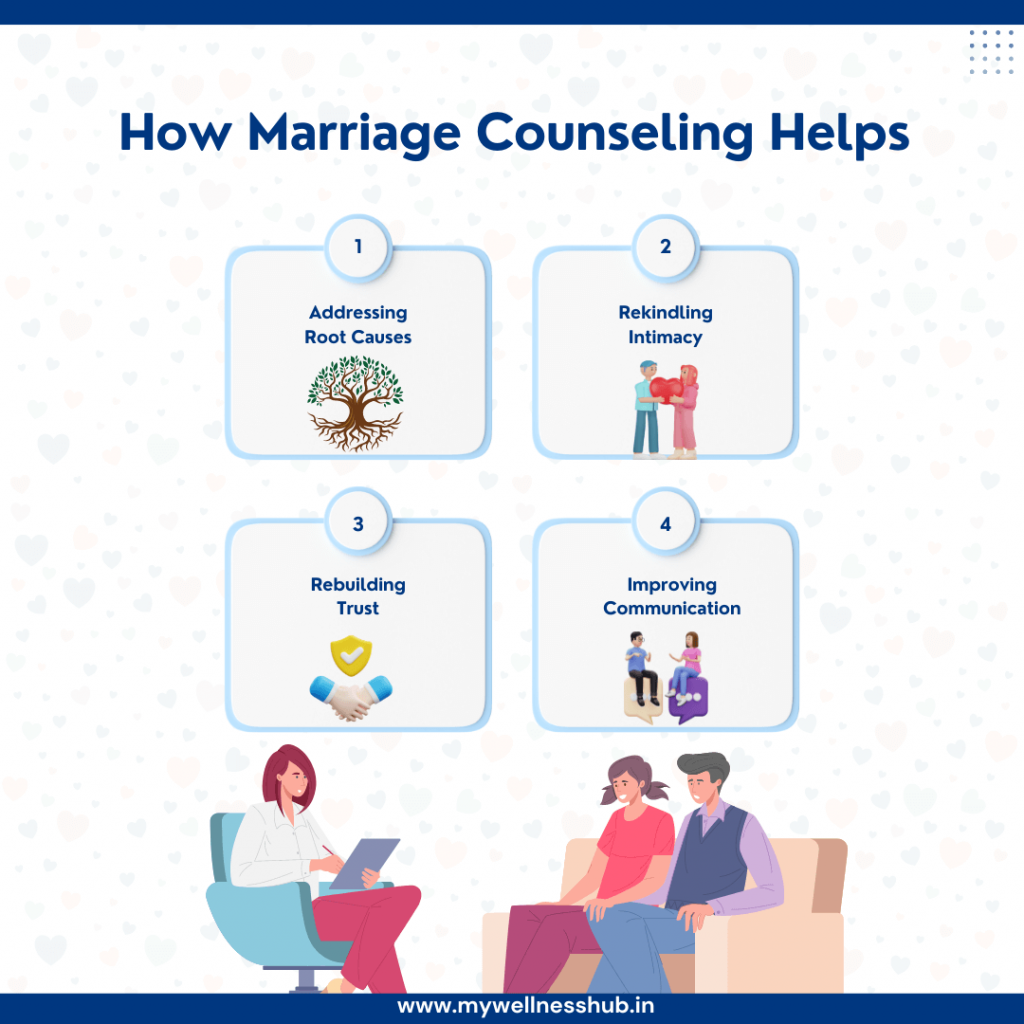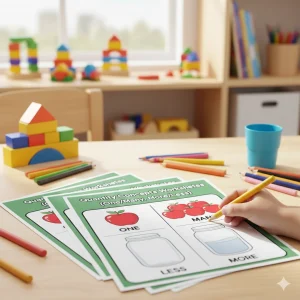Navigating the Storm: Healing and Growth After Relationship Betrayal
By Prapoorna M
Last Updated: July 30, 2024
Betrayal in relationships is an ordeal that, unfortunately, many find all too familiar. It’s a breach of trust that brings with it a whirlwind of pain, questioning, and emotional upheaval. Whether it’s through a whispered secret shared or a commitment broken, the sting of betrayal disrupts the very foundation on which a relationship stands. And while it’s a common experience, it doesn’t lessen the sting or the complexity of emotions that come with it. You’re not alone in feeling this way, and it’s important to remember that the pain you’re experiencing is valid and shared by many.
At Wellness Hub, we understand the profound impact infidelity can have on your mental and emotional well-being. We’ve seen firsthand how it can shake the confidence of the most grounded individuals and put seemingly solid relationships to the test. But amidst this turmoil, there is a path forward—a journey towards healing, forgiveness, and, perhaps, a stronger foundation than before.
Book Your Relationship Counselling Now
Understanding the Impact of Betrayal
As we delve into understanding the impact of betrayal, it’s crucial to recognize that infidelity doesn’t wear just one face. It can manifest in physical actions, emotional connections, or sexual encounters outside of a committed relationship. Each form, while distinct in its characteristics, shares the underlying thread of betrayal—a violation of trust that cuts deep into the fabric of a relationship.

Exploring the Different Faces of Infidelity
Physical infidelity might be the most recognizable form, marked by an individual engaging in sexual activities with someone outside of their committed relationship. It’s the type that often comes to mind first when we think of cheating. But there’s more to infidelity than just the physical aspect. Emotional infidelity occurs when one forms a deep emotional attachment with someone else, sharing thoughts, feelings, or dreams they don’t share with their partner. This type can be just as damaging, as it diverts emotional support and intimacy away from the relationship. Lastly, sexual infidelity, while overlapping with physical betrayal, specifically refers to the act of seeking sexual satisfaction outside the committed partnership, regardless of the emotional involvement.
The Emotional Aftermath
The discovery of any form of infidelity can trigger a tsunami of emotions. Shock and disbelief might hit you first, followed closely by anger, sadness, or even guilt. These feelings are a natural response to the upheaval of your emotional landscape. You may find yourself oscillating between wanting to mend the relationship and wanting to walk away entirely. Confusion often takes center stage as you try to reconcile the person you thought you knew with their actions. It’s a turbulent time, where emotions run high and relief seems just out of reach.
Betrayal’s Broader Impacts
The ripple effects of betrayal extend beyond the immediate emotional turmoil. Your mental health may take a hit, manifesting in anxiety, depression, or a pervasive sense of inadequacy. Self-esteem can suffer, leaving you to question your worth and desirability. The trust you once placed not just in your partner, but in your ability to judge character, may falter. This breach of trust can lead to a cautious or even cynical outlook on relationships, impacting not just the one marred by infidelity but how you approach connections moving forward.
Understanding these impacts is the first step toward healing. By acknowledging the depth and breadth of betrayal’s effects, we start the journey of moving forward. Remember, healing is not just about overcoming the pain of infidelity, but about reclaiming your sense of self and well-being.
The Healing Process
Navigating through the stormy seas of betrayal isn’t straightforward, but the healing process is a crucial journey back to tranquility and self-discovery. As we move into the heart of healing from infidelity, let’s focus on the transformative steps that can foster recovery and personal growth. Remember, this path is as much about healing the relationship (if that’s the route you choose) as it is about healing yourself.

Taking Time to Grieve
First and foremost, give yourself permission to grieve. The loss you’re experiencing is real and profound, encompassing not just the betrayal, but often the future you envisioned together. It’s a time where emotions can be overwhelming, but allowing yourself to feel them is a step towards healing. Journaling can be a powerful tool during this time; it offers a private space to express your feelings and thoughts, which might be hard to articulate out loud. For some, therapy can provide a structured and supportive environment to process these emotions. Therapists or counselors specializing in relationship issues can offer insights and strategies that are crucial for moving forward.
Communication is Key
If you and your partner are leaning towards reconciliation, establishing a new foundation of open and honest communication is essential. This means creating a safe space where both parties can express their feelings, fears, and desires without judgment. It’s about understanding each other’s perspectives and working together to navigate the aftermath of infidelity. Sometimes, couples may find it challenging to communicate effectively without outside help. In such cases, couples therapy can be incredibly beneficial. It’s a space dedicated to rebuilding the communication bridges that betrayal may have damaged.
Rebuilding Trust
Trust is the cornerstone of any relationship, and once it’s been shaken, rebuilding it is a slow and deliberate process. Start with small steps: be transparent about your feelings and actions, keep promises, and show consistency in your efforts to rebuild the relationship. It’s about demonstrating through actions, not just words, that commitment to change is real. This process requires patience from both partners. Trust isn’t rebuilt overnight, but through continuous and genuine efforts.
Prioritizing Self-Care
In the whirlwind of emotions that betrayal stirs up, it’s easy to neglect the most important person: yourself. Engaging in self-care practices is not just about healing from the betrayal; it’s about reaffirming your worth and taking care of your well-being. This can include physical activities like yoga or running, which not only improve physical health but also provide mental clarity. Don’t overlook the importance of nutrition and rest—your body needs strength to heal from stress. Mindfulness or meditation can also be a sanctuary for those seeking peace amidst turmoil.
Moving Forward
As we journey through the healing process, a pivotal moment arrives: the decision to mend the relationship or to part ways. This crossroad is deeply personal and fraught with considerations about self-respect, happiness, and the feasibility of rebuilding what was lost. It’s a time for reflection, not just on the relationship but on what you truly desire for your future.
Making a Choice
Deciding whether to stay in the relationship or to leave is a decision that only you can make. It requires honest self-reflection about what you want, need, and deserve. If the foundation of trust can be rebuilt, and both partners are committed to healing and growing together, reconciliation might be the path forward. On the other hand, it may become clear that the healthiest option is to part ways, allowing both individuals to heal and pursue happiness separately. Remember, prioritizing your well-being and happiness is not selfish—it’s necessary. Whatever choice you make, it should be one that respects your values, desires, and personal growth.
Forgiving Yourself
One of the toughest challenges in the aftermath of betrayal is overcoming self-blame. It’s crucial to understand that you are not responsible for someone else’s actions. The decision to betray was not yours; therefore, the burden of guilt should not be yours to carry. Forgiving yourself is a vital step in reclaiming your self-esteem and moving forward. Remember, forgiveness is not about excusing the betrayal but about freeing yourself from the chains of resentment and self-blame. It’s a gift you give to yourself, a crucial step towards healing.
Also Read: Better ways to communicate in relationships

Cultivating Inner Peace and Happiness
Regardless of the future of your relationship, nurturing your inner peace and happiness is essential. Here are some strategies to help preserve your well-being:
- Establish Boundaries: Learning to set healthy boundaries is crucial for emotional well-being. Boundaries help you define what you are comfortable with and how you expect to be treated by others.
- Engage in Activities You Love: Rediscover or find new hobbies and activities that bring you joy. Engaging in activities you love can be a powerful way to reconnect with yourself and enhance your happiness.
- Lean on Your Support Network: Surround yourself with friends, family, or a support group who understand what you’re going through and offer unconditional support.
- Practice Mindfulness: Mindfulness practices, such as meditation, can help anchor you in the present moment, reducing stress and promoting a sense of peace.
- Seek Professional Support: Sometimes, the guidance of a therapist or counselor can be invaluable in helping you navigate your emotions and make informed decisions about your future.
At Wellness Hub, we understand the complexities of moving forward after betrayal. We’re committed to providing resources, support, and guidance to help you navigate this challenging time. Remember, healing is a journey—not just from pain but towards a deeper understanding of yourself and what brings you peace and happiness.
Before and After Healing Strategies
| Strategy | Before Healing (Challenges) | After Healing (Outcomes) |
|---|---|---|
| Communication | Difficulty expressing feelings, avoidance of discussing the betrayal, fear of confrontation. | Open, honest conversations about feelings and needs, improved ability to discuss difficult topics without fear. |
| Trust | Mistrust in the partner and in one’s own judgment, constant suspicion, fear of future betrayals. | Gradual rebuilding of trust through consistent actions and transparency, improved self-trust and intuition. |
| Self-Care | Neglecting personal needs, self-blame, and decreased self-esteem leading to poor self-care habits. | Prioritization of physical and emotional well-being, engaging in activities that boost self-esteem and promote relaxation. |
| Support System | Isolation, reluctance to share feelings with others, feeling misunderstood or judged by others. | Seeking and accepting support from friends, family, or professionals, feeling understood and supported in the healing journey. |
Strengthening Your Relationship with Yourself and Others
On the path to recovery and healing from betrayal, it’s crucial to recognize this period not only as a time of reflection and healing but also as a pivotal moment for personal growth and strengthening relationships with ourselves and others.
Learning from the Experience
Betrayal, as painful as it is, can also be a powerful teacher. It forces us to confront our vulnerabilities, reassess our boundaries, and often leads to a deeper understanding of our own needs and values. Reflecting on the experience allows us to ask critical questions: What have I learned about myself? How has this experience shaped my understanding of what I need in relationships? By seeking the lessons in our pain, we empower ourselves to make more informed choices in the future, ensuring our emotional well-being is prioritized. This process of introspection can be facilitated through journaling, therapy, or mindful contemplation, all of which provide a framework for turning introspection into actionable insights.
The Role of Support Systems
No one should have to navigate the aftermath of betrayal alone. The support of friends, family, therapists, or coaches can provide not only a sounding board for your feelings and frustrations but also offer perspectives and advice that might not have occurred to you. These support systems act as a lifeline, offering encouragement, compassion, and understanding when you need it most. They remind you of your worth when you might have forgotten it and stand by you as you rebuild your sense of self. Remember, seeking support is a sign of strength, not weakness. It’s an acknowledgment that you value yourself enough to ask for help when you need it.
How Wellness Hub Can Support Your Journey
Our holistic approach to healing encompasses not just the emotional and psychological aspects of betrayal but also the physical and spiritual dimensions of recovery. We understand that healing is a multifaceted process, and each person’s journey is unique. That’s why our resources are designed to meet you where you are, offering a range of support services that include individual counseling, couples therapy, support groups, and wellness workshops.
Individual Counseling and Couples Therapy
Our team of experienced therapists specializes in relationship issues, including infidelity and betrayal. Whether you’re seeking to heal individually or considering the path of reconciliation with your partner, our counselors provide a safe, non-judgmental space to explore your feelings, work through challenges, and develop strategies for moving forward.
Support Groups
Sometimes, finding strength in the presence of others who understand your experience can be incredibly healing. Our support groups offer a community of understanding, empathy, and encouragement, allowing you to share your journey and learn from the experiences of others who are navigating similar paths.
A Path Forward
At Wellness Hub, we believe in the resilience of the human spirit and the power of healing. Our mission is to support you in finding peace, clarity, and strength in the aftermath of betrayal. Through our resources and support services, we’re here to guide you toward a path of healing and renewed hope.
Your journey of healing is deeply personal, and we’re here to support you every step of the way. To explore our resources and learn more about how we can support you, visit Wellness Hub. Together, we can navigate the challenges of betrayal and infidelity, moving towards a future filled with healing, growth, and the possibility of new beginnings.
Progress Indicators in the Healing Journey
| Component | Immediate Aftermath | Signs of Healing Progress |
|---|---|---|
| Emotional State | Shock, anger, sadness, confusion. | Acceptance, peace, emotional stability. |
| Perspective on Betrayal | Focus on the betrayal event and details. | Broader understanding of the relationship dynamics and personal growth. |
| Approach to Future Relationships | Fear of future betrayal, reluctance to trust. | Cautious optimism, willingness to trust based on new understanding and boundaries. |
| Self-Perception | Self-doubt, questioning self-worth. | Increased self-compassion, recognition of personal strength and resilience. |
| Coping Mechanisms | Possible reliance on unhealthy coping strategies (e.g., denial, substance use). | Adoption of healthy coping strategies (e.g., therapy, mindfulness, exercise). |
| Relationship Dynamics | Possibly strained or chaotic interactions if still in contact with the betrayer. | Clearer communication and boundary setting, whether in reconciliation or separation. |
Conclusion
As we wrap up our discussion on navigating through betrayal and moving forward after infidelity, we’ve covered some important ground. We’ve talked about the importance of understanding the impact of betrayal, the need to process your emotions, and how crucial it is to communicate and rebuild trust if you decide to mend the relationship. We also emphasized the importance of self-care and making choices that prioritize your happiness and self-respect. Along the way, we’ve highlighted the power of forgiveness, both towards yourself and possibly towards your partner, and the importance of leaning on your support system to find inner peace and happiness.
Remember, you’re not alone on this journey. It’s okay to seek help and lean on others, whether friends, family, or professionals like those at Wellness Hub. Your path to healing might have its ups and downs, but each step forward is a move towards a stronger, happier you. Stay hopeful, and know that with time and effort, you can move past this betrayal and embrace a future filled with new possibilities and joy.
Frequently Asked Questions:
1. How Long Does It Take to Heal from Betrayal in a Relationship?
The healing process is unique to each individual and can vary based on the nature of the betrayal, the individual’s emotional resilience, and whether both partners are committed to repairing the relationship. There’s no set timeline for healing; for some, it may take months, while for others, it might take years. It’s important to focus on progress rather than a fixed timeline.
2. Can a Relationship Survive Infidelity?
Yes, a relationship can survive infidelity, but it requires both partners to commit to honest communication, rebuilding trust, and working through the underlying issues that led to the betrayal. Success depends on mutual effort, forgiveness, and a desire to rebuild the relationship from both parties.
3. What Are the First Steps to Take After Discovering Infidelity?
After discovering infidelity, it’s crucial to allow yourself to process the shock and emotions that come with the revelation. Communicating your feelings to your partner, seeking support from friends, family, or a therapist, and taking time to reflect on what you want moving forward are essential first steps in the healing process.
4. How Can I Rebuild Trust After Betrayal?
Rebuilding trust after betrayal is a gradual process that includes transparent communication, consistent behavior, and the fulfillment of promises made. Both partners must be willing to work on the relationship, with the betrayer showing genuine remorse and a commitment to change, and the betrayed allowing themselves to gradually open up to trusting again.
5. Is It Normal to Feel Angry or Resentful After Being Betrayed?
Yes, feeling angry, resentful, or hurt after experiencing betrayal is entirely normal. These emotions are part of the healing process. It’s important to acknowledge and express these feelings constructively, rather than suppressing them, to move forward.
6. How Can Wellness Hub Help Me Heal from Betrayal?
Wellness Hub offers a range of resources and support services to help individuals heal from betrayal, including individual counseling, couples therapy, support groups, and wellness workshops. Our holistic approach focuses on healing emotionally, mentally, and physically, guiding you towards recovery and resilience.
7. How Do I Deal with Feelings of Inadequacy After Betrayal?
Feeling inadequate after betrayal is a common reaction. It’s important to remind yourself that the betrayal was not a reflection of your worth. Engaging in self-care activities, affirmations, and therapy can help rebuild your self-esteem. Remember, healing is about focusing on your worth and learning to value yourself more, not less, because of the experience.
8. Can Betrayal Lead to PTSD or Other Mental Health Issues?
Yes, experiencing betrayal, especially when it’s unexpected or involves a close relationship, can lead to PTSD or other mental health issues like depression and anxiety. It’s crucial to monitor your mental health and seek professional support if you’re experiencing persistent distress or symptoms that interfere with your daily life.
9. What Should I Do if My Partner Denies the Betrayal?
If your partner denies the betrayal despite evidence or your gut feeling, it’s important to trust your instincts and maintain boundaries. Open communication is essential, but so is recognizing when professional help, such as couples therapy, may be needed to address the issue and potentially salvage the relationship.
10. How Can I Learn to Trust Again After Betrayal?
Learning to trust again starts with self-trust, understanding your intuition, and recognizing red flags. Rebuilding trust in others takes time and involves observing consistent behavior that demonstrates honesty and reliability. Setting clear boundaries and communicating openly about your needs and fears can also aid in rebuilding trust.
About the Author:
Prapoorna Mangalampalli
M.Sc., M.A., (Dual Masters in Psychology & English) – Counselor (6+ years of experience)
Prapoorna armed with a passionate dedication fueled by dual Master’s degrees in Psychology and English, Prapoorna sheds light on and elevates human experiences. Over 6+ years of experience fuel her insightful approach to counseling, offering profound empathy and guidance across diverse areas like online, marital, relationship, child, family, and career counseling.
At Wellness Hub, she thrives in a team environment that values innovation, compassion, and achieving results for their clients.
Connect with Prapoorna to learn how she can help you or your loved one find their voice and build a brighter future.
Book your Free Consultation Today
Parent/Caregiver Info:
Client’s Details:
* Error Message









